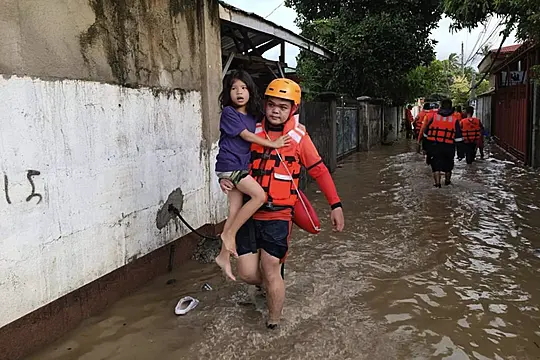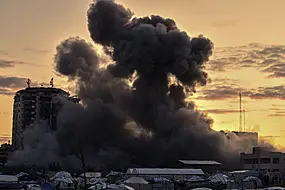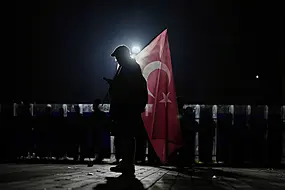Flash floods and landslides set off by torrential rains left at least 47 people dead, including in a hard-hit southern Philippine province, officials said.
At least 42 people were swept away by rampaging floodwaters and drowned or were hit by debris-filled mudslides in three towns in Maguindanao province from Thursday night to early on Friday, said Naguib Sinarimbo, the interior minister for a five-province Muslim autonomous region run by former separatist guerrillas.
Five other people died elsewhere from the onslaught of Tropical Storm Nalgae, which slammed into the eastern province of Camarines Sur early on Saturday, the government’s disaster-response agency said.
But the worst storm impact so far was a mudslide laden with rainwater, rocks and trees that buried dozens of houses with as many as 60 people in the tribal village of Kusiong in Maguindanao’s Datu Odin Sinsuat town, Mr Sinarimbo told The Associated Press by telephone, citing accounts from Kusiong villagers, who survived the flash flood and mudslide.

Eleven bodies, mostly of children, were dug up on Friday by rescuers using spades in Kusiong, he said.
“That community will be our ground zero today,” Mr Sinarimbo said, adding that heavy equipment and more rescue workers including army, police and volunteers have been deployed to intensify the search and rescue work.
The coastal village, which lies at the foot of a mountain, is accessible by road, allowing more rescuers to be deployed on Saturday to deal with one of the worst weather-related disasters to hit the country’s south in decades, he said.
Citing reports from mayors, governors and disaster-response officials, Mr Sinarimbo said 27 died mostly by drowning and landslides in Datu Odin Sinsuat town, 10 in Datu Blah Sinsuat town and five in Upi town, all in Maguindanao.
A death toll of 67 in Maguindanao on Friday night was recalled by authorities after discovering some double counting of casualties.

Army officials also reported at least 42 storm deaths in Maguindanao and said in a statement on Friday night that their forces were “continuing to rescue those trapped in the flood in collaboration with local disaster teams” and take the displaced in army trucks to evacuation camps.
The unusually heavy rains flooded several towns in Maguindanao and outlying provinces in a mountainous region with marshy plains.
Floodwaters rapidly rose in many low-lying villages, forcing some residents to climb onto their roofs, where they were rescued by army troops, police and volunteers, Mr Sinarimbo said.
The coast guard issued pictures of its rescuers, wading in chest-high floodwaters to rescue the elderly and children in Maguindanao. Many of the swamped areas had not been flooded for years, including Cotabato city where Mr Sinarimbo said his house was inundated.
The stormy weather in a large swath of the country prompted the coast guard to prohibit sea travel in dangerously rough seas as millions of Filipinos planned to travel over a long weekend to visit the tombs of relatives and for family reunions on All Saints’ Day in the largely Roman Catholic nation. Several domestic flights have also been cancelled, stranding thousands of passengers.







